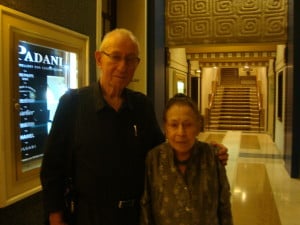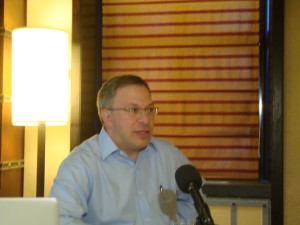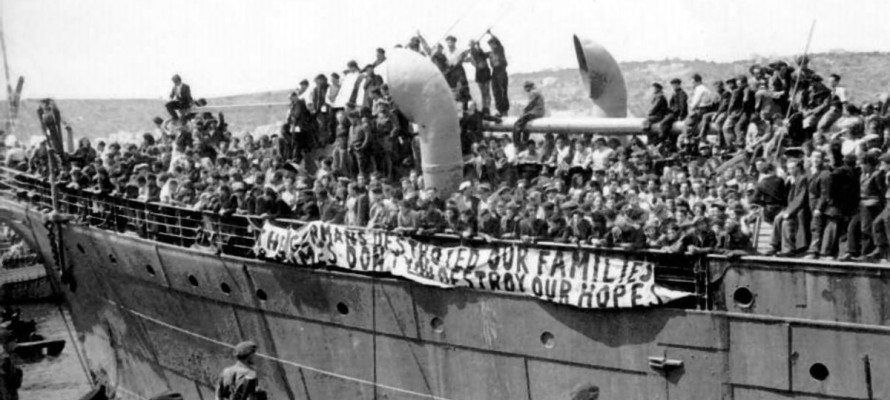Inspired by renowned filmmaker Steven Spielberg’s Survivors of the Shoah Visual History project, American-born Eric Halivni left his job a few years ago to begin documenting stories of witnesses to the founding of the State of Israel for a series titled “Eyewitness 1948.”
By Atara Beck, United with Israel
Founder and executive director of Toldot Yisrael, a Jerusalem-based nonprofit “dedicated to recording and sharing the firsthand testimonies of the men and women who helped found the State of Israel,” Eric Halivni said his organization has collected 700 interviews until now and close to 3,000 hours of footage for a series titled Eyewitness 1948.

Maj. Gen. (ret.) Elad Peled and Dr. Zimra Peled of Generation 1948. (Photo: Atara Beck)
These veterans of the founding of the Jewish State “were witnesses to history,” Halivni explained at a press conference at the King David Hotel in Jerusalem. “They happened to be at the right place at the right time.”
The material will become accessible at the National Library. Danny Streifler, director of Digital Photo Archive and Interactive Services at the Library, described the collaboration with Toldot Yisrael as “the perfect merge.”
Suzy Eban, wife of the late Abba Eban, famous Israeli diplomat and politician, participated in the Eyewitness 1948 series. She has since passed away – in 2011, at the age of 90. In the interview, she evoked the excitement prior to the vote at the United Nations General Assembly on Nov, 29, 1947, that ended in favor of the creation of the Jewish State.
“It was our life,” she recalled with passion. “Some people promised and voted against. Others we reached at the last minute and they voted for us.”
Eyewitness 1948: An Opportunity that Occurs Once in 2,000 Years
Maj. Gen. (ret.) Elad and Dr. Zimra Peled, who attended the press conference, recalled their experiences as fighters for an independent Jewish state.
“Today, you can’t find survivors of the American Revolution,” Elad Peled, 87, asserted. “To be part of Generation 1948 is something [to which] there is no comparison. We were looking to take part in this episode of Jewish history and to survive because [an opportunity like this] occurs once in 2,000 years.”
The Peleds, who both hold doctorates from Columbia University, met while serving in the Palmach – the elite fighting force of the Haganah, the underground army in British-Mandated Palestine – in 1946. Now great-grandparents, they were married on Jan. 18, 1948
Elad described his role as commander and head of the rescue effort in the northern city of Tzfat (Safed) after the British left and the Jews needed protection.

Eric Halivni, inspired by filmmaker Steven Spielberg, created “Eyewitness 1948,” documenting stories of those who lived through the War of Independence. (Photo: Atara Beck)
“We thought we would die,” Peled said; they were thinking of the 35 courageous fighters – known as the Lamed Heh, the Hebrew letters representing the number 35 – caught trying to save the Etzion Bloc and subsequently slaughtered.
After the successful mission, “the [then] rabbi of Tzfat said the city was saved by two things: the prayers and the miracle that the Palmach arrived,” Peled said
In 1967, Peled served as Chief of Operations of the Southern Command in the Six Day War. From 1970 until 1976 he was director-general of the Ministry of Education, Culture and Sport.
Zimra, who later became a researcher and lectured at Ben-Gurion University of the Negev, was a first-aid nurse in the Palmach; she joined convoys travelling between Tel Aviv and Jerusalem, in which hundreds were killed.
“There are some convoys I will never forget,” she said.
Even their personal love story was fascinating to hear, but that would deserve for an entirely new article.
Meanwhile, “the main priority is to try and interview as many people as possible within a short period of time,” Halivni said.
“This afternoon we’re going to another funeral of one of our Palmach chevra (group of friends),” Peled said. “We are disappearing every week.”
